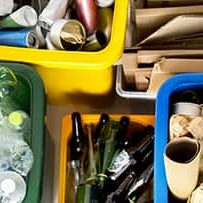Recycling to some degree is second nature to many homeowners but, as environmental awareness has increased, so has the pressure to increase the amount we recycle. Many people want to do their part, but find themselves not knowing where to start. Here are seven tips you will need to improve your household’s recycling.
-
Research what can and cannot be recycled in your area
As a responsible homeowner, it is important to stay informed on what materials can and cannot be recycled in your area. Knowing this will save resources, preserve the environment, and protect the wildlife that could be affected by the improper disposal of materials. So, what can you recycle? Items like paper, plastic bottles, cartons and boxes, scrap metal, glass jars and bottles should all be able to be recycled. Objects such as batteries or broken electronics, greasy pizza boxes and bottles with contents still inside are all examples of items that should not be recycled. Becoming more aware will help lead to a better environment. This is a process which starts from our individual efforts!
-
Purchase bins for different types of recyclables
An effective way of increasing your recycling is by investing in bins for different types of items. This can make it much easier to properly separate your materials, ensuring that the items you wish to discard don’t end up polluting the environment. It also provides a convenient way for everyone in the household to have easy access and knowledge of what should and shouldn’t be recycled. Furthermore, when properly disposing of items at home you’re teaching your family or housemates the importance of being mindful and responsible with our world. Therefore, purchasing bins for your different types of items is a crucial step on the road towards sustainability.
-
Rinse out all food and drink containers before recycling
To be recycled properly, food and drink containers need to be rinsed before being placed in the recycling bin. This process helps prevent unwanted bacteria from contaminating the rest of the materials that are being recycled. Doing this adds a small extra step as part of your recycling routine, but it is necessary to make sure that only the clean materials that are meant to be recycled are actually included in that bin. When it comes to recycling effectively, rinse out all food and drink containers before placing them in the recycling bin.
-
Keep your recycling bins clean and free of non-recyclable materials
It’s essential to keep your recycling bins clean and free of any non-recyclable materials if you plan to recycle properly. Keeping your bins clean by ensuring no non-recyclable material ends up inside helps ensure that our recycling centres don’t have to send improperly recycled waste back into the landfill. When everyone plays their part in helping recycle properly, we will all benefit from a cleaner planet!
-
Store your bins in a convenient location for easy access
Having designated bins for rubbish and recyclable materials is an important step towards improving our environment, and it’s much easier when your bins are stored in a convenient location. This will make sorting and disposing of your items quick and easy, with minimal hassle to you. Instead of trying to juggle multiple bags or leaving them outside your front door to be sorted the night before bin day, allocate a specific place for each bin – it will be beneficial in the long run. Keeping them visible will also help remind others in your household to follow good recycling habits.
-
Small objects can cause big problems
When it comes to recycling, there are certain items that should not be recycled no matter how small they may be. For example, plastic straws and utensils, Styrofoam containers, used tissues and paper towels, crisp packets and more cannot be recycled due to the materials used in their production. These items often slip through the sorting machines at recycling facilities and end up in landfills instead of being reused. By understanding which materials can or cannot be recycled you will help keep our planet healthy.
-
Educate others about the benefits of recycling
Recycling is an important part of our global efforts to keep the planet healthy. By recycling materials that we would otherwise throw away, we can not only reduce the amount of rubbish sent to landfills, but also help reduce greenhouse gas emissions by saving energy. Not only does recycling benefit our planet, but it can also benefit our population by helping to conserve natural resources and reduce pollution. By educating people, whether it’s your family or your colleagues, on these advantages, we can create a powerful movement that can preserve our environment for generations to come.
Recycling is not only good for the environment, but it’s also a fantastic way to limit our waste and give new life to materials that would otherwise have gone to a landfill. By following our tips, you can efficiently recycle your waste the right way. The small steps we take together can make a big impact over time. To find out more about recycling in your area such as Bromley or Lewisham, or to find out how to dispose of your bulky waste, get in touch with our team at Junk Taxi. We are available on 020 3092 2961 or info@junktaxi.co.uk.

